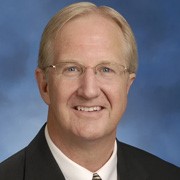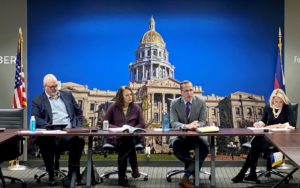In this Capitol Report:
- Family & Medical Leave Task Force Held Final Meeting this Week
- Rulemaking Hearing Held on Proposed Colorado Overtime & Minimum Pay Standards Order
- Public Option Heated Topic at Colorado Chamber Health Policy Council Meeting
- Office of Attorney General Holds Data Privacy and Cybersecurity Forum on Best Practices
- Winter is Coming, and so is the 2020 Legislative Session... Sponsor a Policy Council Meeting!
- Colorado Leadership Updates: Courtney Reynolds Elected to Board, Edie Sonn to Executive Committee
Family & Medical Leave Task Force Held Final Meeting this Week
The FAMLI Task Force held its final meeting this week and finalized its list of recommendations and/or options for the Colorado General Assembly to consider for adopting a state-run paid family and medical leave program during the 2020 Legislative Session. The Task Force will spend the holiday writing up its report which will be presented to the General Assembly by January 8, 2019 for its review and determination of next steps.
Out of the many issues discussed and debated by the Task Force over the last five months, it reached consensus on several areas but reached NO consensus on some of the same issues that were highly debated during the 2019 Legislative Session. A list of some of the areas in which consensus was achieved or not achieved is provided below and a link to the final vote count and explanation is provided here: https://drive.google.com/file/d/1RPy2sqMYHV2O7wP47Vn0qx9bRrlt22w1/view
Areas of Consensus by Task Force Members:
- Purpose of paid leave;
- Self-employed workers’ access to leave;
- Eligibility for taking leave;
- Definition of family member [NO consensus reached on an addendum asking Legislature to consider other family definition models];
- Wage replacement amounts;
- Maximum weekly wage replacement amount;
- Collection of premiums up to wages equal to 80% of social security maximum;
- Program implementation;
- Sustainability of the program;
- Portability of benefits;
- Creation of mechanisms to lower burden on small businesses such as tax deductions or premium deductions;
- Exemption for employers w/equivalent or better existing plans;
- Interaction with other benefits;
- Prohibiting stacking of leave (between state and federal paid family leave programs);
- Type of program – Task Force agreed that the program should be a state administered model;
- Employer vs. employee funded – Task Force agreed that program should be 100% funded by workers. In the case of an employer/worker funding split, small businesses (15 or fewer employees) would be exempt from paying the employer side premium.
Lack of Agreement by Task Force Members:
- Period of time workers need to be on the job to receive the benefits. Task Force members proposed 120 days, 180 days or 1 year;
- Consideration of other family definition models;
- Exemption from job protection for certain size/types of employers;
- Duration of leave for family or medical leave;
- Duration of leave for bonding.
Next Steps:
The Colorado General Assembly will need to review the Task Force’s report, and determine the type of paid family & medical leave legislation they would like to see implemented for the State of Colorado. We expect the debate to continue during the duration of the 2020 Legislative Session.
We are grateful to all of the members who served on this Task Force and the CDLE staff for their work during the Task Force process. We are especially
grateful to the Colorado Chamber’s appointees: Stacey Campbell, Shareholder, Campbell Litigation, and Board Chair of the Colorado Chamber of
Commerce, and Dana Hagood, Executive Director of Human Resources Regional Operations at USAA. We applaud their time, energy and patience during the last five months!
Please contact Loren Furman at [email protected] with any questions regarding this matter.
Rulemaking Hearing Held on Proposed Colorado Overtime & Minimum Pay Standards Order
This week, the Colorado Division of Wage and Statistics within the Colorado Department of Labor & Employment held a rulemaking hearing on the proposed Minimum Wage Order. The Colorado Chamber submitted formal comments to the Division regarding concerns that its members have raised on the proposed Order.
During the hearing, Dan Block, an attorney at the law firm of Robinson, Waters & O’Dorisio, P.C., testified on behalf of the Colorado Chamber of Commerce and shared concerns with several provisions of the proposed order, other than regarding the Chamber’s concerns about the minimum salary for exemptions from the Order, including:
- The exceptions from the “regular rate” of pay, including vacation pay, holiday pay, and sick leave. Mr. Block testified that companies may use paid personal leave instead of vacation pay and sick leave, and he recommended that the Division add personal leave to the list of exceptions from the regular rate of pay.
- Section 1.8.1. regarding the definition of travel time. Mr. Block recommended making the language consistent with the Fair Labor Standards Act to exclude travel time that occurs outside of the employee’s regular work hours, whether that travel is during the workweek or on the weekend.
- Section 2.2, regarding exemptions from minimum wage and overtime. He asked that the outside salespersons’ exemption be made consistent with the Fair Labor Standards Act; and that the computer employees’ exemption, which exemption is in the regulations of the Fair Labor Standards Act, be added to that section of the Order.
- Additional comments by Mr. Block included concerns with Section 5.2.4 regarding the need for employers to pay employees for missed rest periods, and Section 6.3.1 regarding the language about employers paying for employee’s uniforms.
Next Steps on the Proposed Minimum Wage Order:
The Division will continue to receive formal comments from interested parties with concerns on the proposed Order until December 31st. Please submit any formal comments to [email protected] prior to December 31st.
The formal rule will be adopted on January 10, 2020 and the rule will take effect on Sunday, March 1, 2020, with the exception of new exempt salaries which will take effect on July 1, 2020.
Public Option Heated Topic at Colorado Chamber Health Policy Council Meeting
The Colorado Chamber’s Health Care Policy Council this week hosted Michael Conway, Colorado Insurance Commissioner, to discuss the Division of Insurance’s proposed public health Insurance option plan. Council members pressed Conway on the details of the plan and expressed concerns about unintended consequences.
The goal of the plan is to lower health care costs, but there are many unknowns in the current proposal about how the Division will actually accomplish that goal. The way the current plan is structured, for example, allows the government to set hospital reimbursement rates, and Colorado Chamber members are concerned that it will result in a shift of costs from individual plans to employer-sponsored plans. It’s unclear how the state would prevent that cost-shift from occurring.
Higher health care costs, particularly for employer-sponsored plans, would increase the cost of doing business in Colorado. The Colorado Chamber will continue to monitor how the proposal develops in the 2020 legislative session.
Office of Attorney General Holds Data Privacy and Cybersecurity Forum on Best Practices
The Office of the Colorado Attorney General, the Attorney General Alliance, and the National Cybersecurity Center will be holding a forum in Colorado on best practices for small and mid-sized businesses to comply with federal and state data privacy and cybersecurity laws.
Colorado Chamber members interested in this event can register through the following link:
https://www.cvent.com/c/express/40d40aaa-2980-4851-bd5c-dc5b14420890
Winter is Coming, and so is the 2020 Legislative Session... Sponsor a Policy Council Meeting!
Sponsoring a Policy Council meeting puts you front and center with key legislators, government officials, and Colorado Chamber members.
The following Councils are available to all our members:
- Energy and Environment Council
- HealthCare Council
- Labor and Employment Council
- Governmental Affairs Council
- Tax Council
Each Council will meet at noon at the Colorado Chamber of Commerce office throughout the session. Lunch is served at each meeting. Sponsorship of council meetings by our members is crucial to maintaining the practice of providing lunch during these important council meetings. We need sponsors for every meeting, so we would like to encourage members to sign up now to sponsor a lunch! Sponsors receive recognition in both email reminders for the meeting and our online Events Calendar, as well as during the meeting. The Colorado Chamber of Commerce does all of the ordering and setup of the lunch and the sponsorship is always a flat rate of $650. Please contact Laura Moss for more details or to sign up as a sponsor. We appreciate your ongoing support!
Please see the below for specific dates for each council. Councils always meet from Noon to 1:15 p.m. in our conference room at 1600 Broadway, Suite 1000.
2019-2020 Council Meeting Dates
Energy & Environment Council:
January 29, 2020
February 25, 2020
March 24, 2020
April 29, 2020
Governmental Affairs Council:
January 28, 2020
February 11, 2020
March 31, 2020
April 27, 2020
HealthCare Council:
December 17, 2019
January 16, 2020
February 13, 2020
March 12, 2020
April 16, 2020
Labor & Employment Council:
November 20, 2019
January 22, 2020
February 19, 2020
March 18, 2020
April 22, 2020
Tax Council:
January 17, 2020
February 7, 2020
March 6, 2020
April 17, 2020
Colorado Leadership Updates: Courtney Reynolds Elected to Board, Edie Sonn to Executive Committee
The Colorado Chamber of Commerce Board of Directors has elected Courtney Reynolds, Vice President of Communications and Corporate Affairs for Ball Corporation, to serve on the board.
Edie Sonn, Vice President of Communications and Public Affairs for Pinnacol Assurance and current Colorado Chamber board member, was also selected to serve on the Chamber’s Executive Committee.
We’re proud to have Reynolds and Sonn on the Colorado Chamber team!






